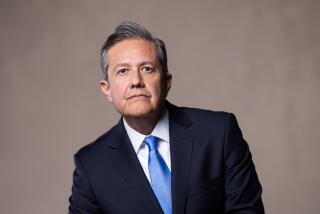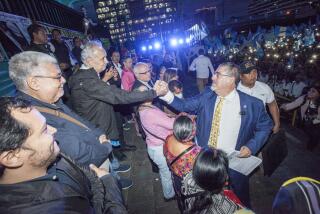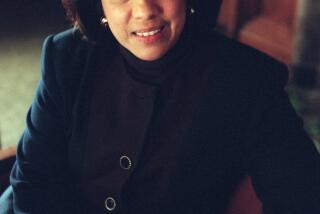OBITUARIES : Jose Diokno; Philippine Human Rights Leader
- Share via
MANILA — Jose Wright Diokno, one of his nation’s most respected human rights advocates, a political ally and close friend of President Corazon Aquino and an opponent of U.S. military bases in the Philippines, died Friday.
Diokno died at his home one day after his 65th birthday. He had been suffering from cancer since 1984 and had undergone treatment in the United States.
Diokno belonged to a group of distinguished lawyers who defended human rights activists during eight years of martial law under former President Ferdinand E. Marcos, starting in 1972.
Aquino described Diokno as a “giant of a man” who “braved the Marcos dictatorship with a dignified and eloquent courage our country will long remember.”
After Marcos declared martial law, Diokno was imprisoned for two years and shared a cell with Mrs. Aquino’s husband, Benigno, who led the opposition against Marcos and was assassinated in 1983 after returning from exile.
Last year, Diokno was appointed chairman of a government panel negotiating peace with Communist rebels, but had to step down because of poor health and was replaced by his daughter, Maria Serena.
He also served as chairman of Mrs. Aquino’s Presidential Commission on Human Rights, but resigned last month to protest the Jan. 22 killings by security forces of 12 demonstrators demanding land reform.
Diokno, one of 10 children, was born in the coastal town of Taal in Batangas Province 50 miles south of Manila. His father, Ramon Diokno, was a Supreme Court associate justice.
Diokno graduated summa cum laude from De La Salle University in Manila with a degree in commerce and later earned a law degree from the University of Santo Tomas. He scored the highest marks in the national Bar examination of 1944.
He served as secretary of justice from 1961 to 1962 and one year later was elected to the Senate, where he became a leading opponent of Marcos.
From 1975 to 1980, Diokno served as chairman of the Civil Liberties Union and headed the Legal Assistance Group which provided legal counsel to those arrested by the Marcos government.
He proposed closing U.S. military bases in the Philippines and reducing the dependency of the economy on exports which he said makes it vulnerable to recessions in the United States and Japan.
More to Read
Sign up for Essential California
The most important California stories and recommendations in your inbox every morning.
You may occasionally receive promotional content from the Los Angeles Times.













